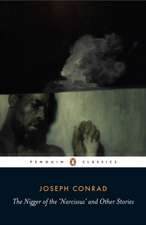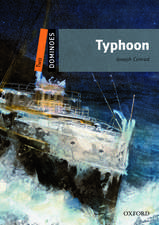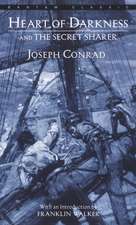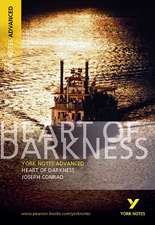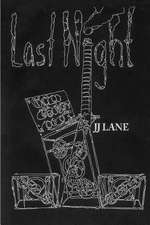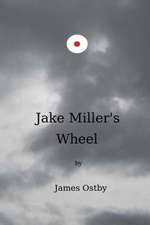The Portable Conrad
Autor Joseph Conraden Limba Engleză Paperback – 30 noi 2007 – vârsta de la 18 ani
A great novelist of the sea, a poet of the tropics, a critic of empire and analyst of globalization, a harbinger of the modern spy novel, an unparalleled observer of the moments in which people are stripped of their illusions-Joseph Conrad is one of the greatest writers of the twentieth century. This revised edition of The Portable Conrad features the best known and most enduring of Conrad's works, including The Secret Agent, Heart of Darkness, and The Nigger of the "Narcissus," as well as shorter tales like "Amy Forster" and "The Secret Sharer," a selection of letters, and his observations on the sinking of the Titanic.
Preț: 182.74 lei
Nou
Puncte Express: 274
Preț estimativ în valută:
34.97€ • 36.33$ • 29.05£
34.97€ • 36.33$ • 29.05£
Carte disponibilă
Livrare economică 13-27 ianuarie 25
Preluare comenzi: 021 569.72.76
Specificații
ISBN-13: 9780143105114
ISBN-10: 0143105116
Pagini: 702
Dimensiuni: 148 x 189 x 34 mm
Greutate: 0.51 kg
Editura: Penguin Books
ISBN-10: 0143105116
Pagini: 702
Dimensiuni: 148 x 189 x 34 mm
Greutate: 0.51 kg
Editura: Penguin Books
Cuprins
The Portable Conrad Acknowledgments
Introduction by Michael Gorra
Joseph Conrad: A Chronology
I. A Calm and a Storm
The Secret Sharer: An Episode from the Coast
Preface to The Nigger of the "Narcissus"
The Nigger of the "Narcissus": A Tale of the Sea
II. Three Stories
Karain: A Memory
Amy Foster
The Warrior's Soul
III. Heart of Darkness
Heart of Darkness
IV. The Secret Agent
Author's Note
The Secret Agent: A Simple Tale
V. Essays, Autobiography, and Letters
Autocracy and War
Some Reflections on the Loss of the Titanic
FROM The Mirror of the Sea, "Initiation"
FROM A Personal Record
Letters
To Marguerite Poradowska, 26 September 1890
To Carol Zagorski, 10 March 1896
To R. B. Cunninghame Graham, 20 December 1897
To Edward Garnett, 29 March 1898
To John Galsworthy, 12 March 1899
To R. B. Cunninghame Graham, 14 October 1899
To William Blackwood, 31 May 1902
To Roger Casement, 21 December 1903
To William Rothenstein, 3 September 1904
To J. B. Pinker, 30 July 1907
To J. B. Pinker, 16? July 1908
To Edward Garnett, 27 May 1912
To John Quinn, January 1917
To John Quinn, 6 February 1918
To Hugh Walpole, 10 February 1922
To C. K. Scott Moncrieff, 17 December 1922
Suggestions for Further Reading
Introduction by Michael Gorra
Joseph Conrad: A Chronology
I. A Calm and a Storm
The Secret Sharer: An Episode from the Coast
Preface to The Nigger of the "Narcissus"
The Nigger of the "Narcissus": A Tale of the Sea
II. Three Stories
Karain: A Memory
Amy Foster
The Warrior's Soul
III. Heart of Darkness
Heart of Darkness
IV. The Secret Agent
Author's Note
The Secret Agent: A Simple Tale
V. Essays, Autobiography, and Letters
Autocracy and War
Some Reflections on the Loss of the Titanic
FROM The Mirror of the Sea, "Initiation"
FROM A Personal Record
Letters
To Marguerite Poradowska, 26 September 1890
To Carol Zagorski, 10 March 1896
To R. B. Cunninghame Graham, 20 December 1897
To Edward Garnett, 29 March 1898
To John Galsworthy, 12 March 1899
To R. B. Cunninghame Graham, 14 October 1899
To William Blackwood, 31 May 1902
To Roger Casement, 21 December 1903
To William Rothenstein, 3 September 1904
To J. B. Pinker, 30 July 1907
To J. B. Pinker, 16? July 1908
To Edward Garnett, 27 May 1912
To John Quinn, January 1917
To John Quinn, 6 February 1918
To Hugh Walpole, 10 February 1922
To C. K. Scott Moncrieff, 17 December 1922
Suggestions for Further Reading
Recenzii
"This is the best one-volume selection of Conrad available. Michael Gorra's learned and acute introduction puts both Conrad, and Conrad criticism, in essential context."
-James Wood
-James Wood
Notă biografică
Joseph Conrad (originally Józef Teodor Konrad Nalecz Korzeniowski) was born in the Ukraine in 1857 and grew up under Tsarist autocracy. His parents, ardent Polish patriots, died when he was a child, following their exile for anti-Russian activities, and he came under the protection of his tradition-conscious uncle, Thaddeus Bobrowski, who watched over him for the next twenty-five years. In 1874 Bobrowski conceded to his nephew's passionate desire to go to sea, and Conrad travelled to Marseilles, where he served in French merchant vessels before joining a British ship in 1878 as an apprentice. In 1886 he obtained British nationality and his Master's certificate in the British Merchant Service. Eight years later he left the sea to devote himself to writing, publishing his first novel, Almayer's Folly, in 1895. The following year he married Jessie George and eventually settled in Kent, where he produced within fifteen years such modern classics as Youth, Heart of Darkness, Lord Jim, Typhoon, Nostromo, The Secret Agent and Under Western Eyes. He continued to write until his death in 1924. Today Conrad is generally regarded as one of the greatest writers of fiction in English—his third language. He once described himself as being concerned 'with the ideal value of things, events and people'; in the Preface to The Nigger of the 'Narcissus' he defined his task as 'by the power of the written word ... before all, to make you see'.
Michael Gorra is a professor of English at Smith College. His books include The Bells in Their Silence: Travels Through Germany and After Empire: Scott, Naipaul, Rushdie.
Michael Gorra is a professor of English at Smith College. His books include The Bells in Their Silence: Travels Through Germany and After Empire: Scott, Naipaul, Rushdie.

